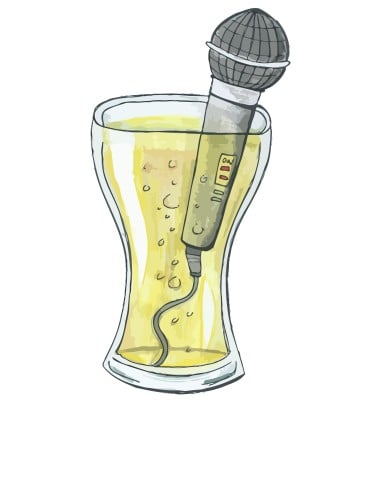Unless you’re in a science program, the last time many of us thought of science as “fun” was back in grade two while watching The Magic School Bus. Thanks to Tox on Tap, you may just rediscover your love for all things weird and wonderful in the scientific world.
Tox on Tap is an informal and friendly meeting at a pub for people to come together and discuss the latest news from the scientific world. Based upon the French tradition of a “Café Scientifique,” Tox on Tap is meant to educate the general public about science topics and bring more visibility to scientists and researchers.
Although resources like the Internet make information increasingly accessible, Tox on Tap is a social and educational experience that is difficult to get anywhere else. Derek Green, a toxicology graduate student at the University of Saskatchewan, recognizes the uniqueness of the program.
“It’s a public outreach initiative, the idea being that it’s a really unique, informal environment where you have an opportunity to get a real short, lay-person-friendly lecture or talk from a notable expert in a field related to toxicology,” Green said.
Founded by two former toxicology graduate students from the U of S, Tox on Tap is now facilitated by Green, Erin Mahoney and Larry D’Silva, who are all completing master’s degrees in toxicology. The three have a passion for sharing their love of science with the world.
Tox on Tap is generally held on the third or fourth Tuesday of every month during the school year. These days, discussions take place at The Woods Alehouse in downtown  Saskatoon. Attendees can have their scientific lectures along with a strong drink and some delicious pub food.
Saskatoon. Attendees can have their scientific lectures along with a strong drink and some delicious pub food.
The speakers are usually experts within their fields who give a short lecture followed by a break where people can refill their glasses. After that, the real fun begins with questions from the audience.
“Usually the question and answer period is pretty lively. It’s fun. People really speak their minds about what’s going on, especially if they’re not coming from the toxicology department at the U of S. It’s really great to get in there,” Mahoney said.
With the intent to bridge the gap between the scientific community and the general public, Tox on Tap presents a wide variety of topics for discussion.
“Our topics, although they’re focused on toxicology, they’re broader than that. So it’s not that you’re going to walk in and we’re only going to be talking about toxicology. It’s environmental issues or current events. We had a really good one on radiation and nuclear energy, and that wasn’t specifically focused on the toxicological aspects. It’s more reaching than that,” Mahoney said.
Green echoed these sentiments and thinks Tox on Tap has a practical use.
The gap between the scientific community and the rest of the world can sometimes seem quite broad, which is ineffective for finding solutions to complex problems.
“There’s often this very weird divide between scientists and everybody else,” Mahoney said. “It’s great that we all talk about it amongst ourselves, but if it’s not ready and open for the public then nothing’s going to get done and no one’s going to be talking about it.”
Tox on Tap provides a forum for people to learn more about issues that they may never have heard of before, but affect them every single day.
“If they have any questions they can ask right away instead of having to look up the information on their own, which can sometimes be inaccessible unless you have access to these journals,” D’Silva said.
In the end, Tox on Tap is about closing gaps — gaps between groups, gaps in knowledge and the gaps between problems and solutions. D’Silva summed up Tox on Tap the best when he described his hopes for those who attend.
“Overall, if they can just get a better interest and love of science, then that’s awesome. If they can see what we see, and just gain our enthusiasm for it, then that’s all the better.”
For more information about Tox on Tap, visit toxontap.wix.com/sask.
—
Image: Ashley Britz
Leave a Reply